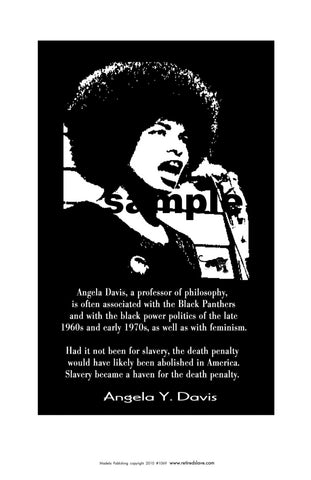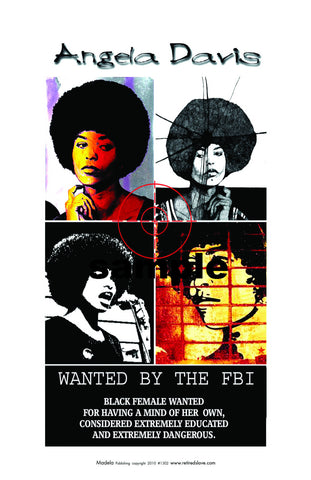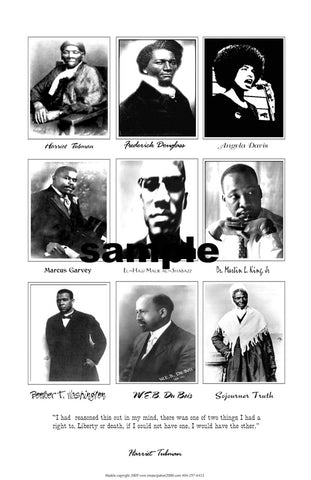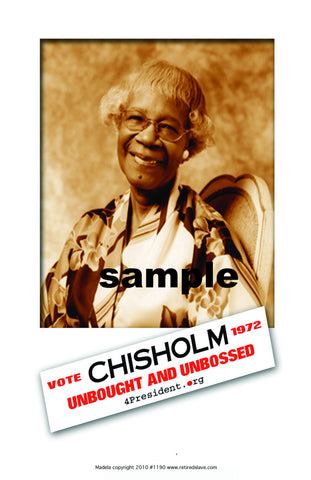Shirley Chisholm #1616
$ 8.00
Caption from poster__
Shirley Chisholm
You don't make progress by standing
on the sidelines, whimpering and
complaining. You make progress
by implementing ideas.
Shirley Anita St. Hill Chisholm (November 30, 1924 – January 1, 2005) was an American politician, educator and author. She was a Congresswoman, representing New York's 12th District for seven terms from 1968-1983. In 1968, she became the first African American woman elected to Congress. On January 23, 1972, she became the first African American to make a bid to be President of the United States. Other women to run for President of the United States are listed here. Born in Brooklyn, New York, of a Barbadian mother and a Guyanese father, Shirley St. Hill spent part of her childhood in Barbados with her grandmother, and received an education in the British-run school system. She later attended Brooklyn College and graduated with a Bachelor of Arts degree in 1946. While working as a teacher, Chisholm earned a Master's degree in elementary education from Teachers College, Columbia University. From 1953-1959, she was director of the Hamilton-Madison Child Care Center, and from 1959-1964, was an educational consultant for the Division of Day Care. In 1964, Chisholm ran and was elected to the New York State Legislature. She then ran as the Democratic candidate for New York's 12th District congressional seat and was elected to the House of Representatives in 1968, defeating Republican candidate James Farmer and becoming the first African-American woman elected to Congress. As a freshman, Chisholm was assigned to the House Forestry Committee. Given her district, she felt the placement was a waste of time and shocked many by demanding reassignment. She was placed on the Veterans' Affairs Committee. Soon after, she voted for Hale Boggs as House Majority Leader over John Conyers. As a reward for her support, Boggs assigned her to the much-prized Education and Labor Committee; she was the third-highest ranking member when she retired. Chisholm joined the Congressional Black Caucus in 1969, as one of its founding members. In 1972, Chisholm made a bid for the Democratic Party's presidential nomination, receiving 152 delegate votes but ultimately losing the nomination to South Dakota Senator George McGovern. Chisholm's base of support was ethnically diverse and included the National Organization for Women. Among the volunteers who were inspired by her campaign was Barbara Lee, who would go on to become a congresswoman some 25 years later. (Currently, Barbara Lee has a couple of pieces of legislation that would honor Shirley Chisholm, including H Con Res 9, calling on the US Postal Service to create a stamp honoring her, and HR 176, which would create a program to encourage educational exchanges between the US and Caribbean nations.) Chisholm said she ran for the office "in spite of hopeless odds," "to demonstrate the sheer will and refusal to accept the status quo." Chisholm created controversy when she visited rival and ideological opposite George Wallace in the hospital soon after his shooting during that campaign. Several years later, when Chisholm worked on a bill to give domestic workers the right to a minimum wage, Wallace got her the votes of enough southern congressmen to push the legislation through the House. Throughout her tenure in Congress, Chisholm would work to improve opportunities for inner-city residents. She was a vocal opponent of the draft and supported spending increases for education, healthcare and other social services, and reductions in military spending. She announced her retirement from Congress in 1982, and was replaced by a fellow Democrat, Major Owens, in 1983. After leaving Congress, Chisholm was named to the Purington Chair at Mount Holyoke College in South Hadley, Massachusetts, where she taught for four years. She was also very popular on the lecture circuit. Chisholm was married to Conrad Chisholm from 1949-1977. Upon their divorce, she married Arthur Hardwick, Jr., who died in 1986. Shirley Chisholm was a member of Delta Sigma Theta Sorority. In 1993, she was inducted into the National Women's Hall of Fame. Chisholm also authored two books, Unbought and Unbossed (1970) and The Good Fight (1973). Chisholm retired to Florida and died on January 1, 2005. She is buried in Forest Lawn Cemetery in Buffalo, NY. In February 2005, Shirley Chisholm '72: Unbought and Unbossed, a documentary film chronicling Chisholm's 1972 bid for the Democratic presidential nomination, was aired on U.S. public television. Directed and produced by independent, black woman filmmaker Shola Lynch, the film was featured at the Sundance Film Festival in 2004. On, April 9, 2006, the film was announced as a winner of a Peabody Award.




